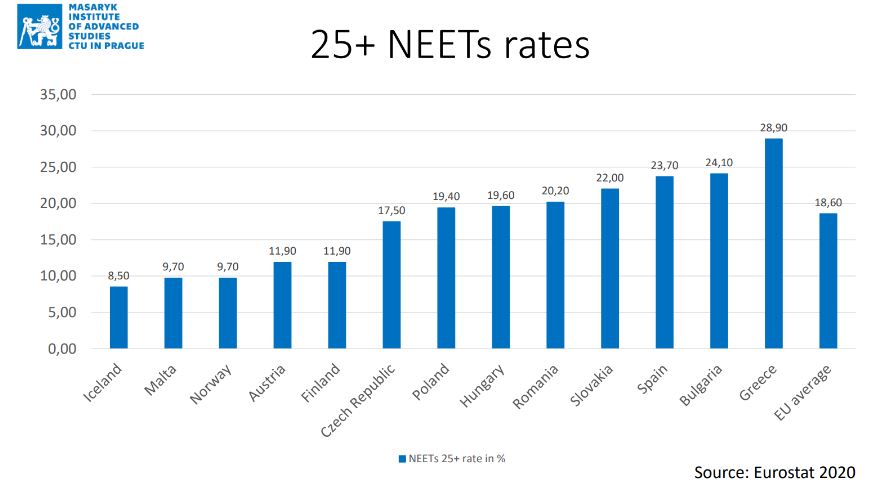The issue of NEETs (Not in Employment, Education, or Training) has been a pressing concern in Europe, particularly among young individuals between 18 and 30. However, one specific and often overlooked group within this category is the NEETs aged 25 and older, affectionately referred to as the “lost millennials.” This cohort represents one of the most vulnerable segments in the labour market, facing unique challenges from their limited work experience and societal pressures.
This article presents the highlights of the “Lost Millennials” project, a Transnational Research Network for the Evaluation of Initiatives Targeting 25+ NEETs, supported by the EEA and Norway Grants Fund for Youth Employment, research findings as presented during the EDULEARN23 conference in Palma de Mallorca by Petr Fanta from IREAS, our partner organisation from the Czech Republic. His presentation at the conference offered invaluable insights into the factors influencing the employability of NEETs aged 25 and above in the European countries of Austria, Bulgaria, Czech Republic, Finland, Greece, Hungary, Iceland, Malta, Norway, Poland, Romania, Slovakia, and Spain.
Methodology
The study utilised a comprehensive methodology, combining desk research and qualitative analysis to provide an in-depth understanding of the NEET’s situation. Eurostat data was harnessed to compare and interpret the statistical information from the selected countries. In addition, qualitative research conducted within the Lost Millennials project offered crucial insights to complement the quantitative findings.
Results
1. NEETs Rates in Selected European Countries
The study identified three distinct categories of countries based on the NEET rates among the 25+ age group. Countries below 10% were classified as having a low NEET rate, including Iceland, Malta, Norway, Austria, and Finland. Meanwhile, Spain and Greece fell into the category of high overall NEET rates, with rates above 20%. The post-socialist countries (Czech Republic, Slovakia, Poland, Hungary, Romania, and Bulgaria) showed a medium NEET rate between 10% and 20%.
 2. NEETs Inactivity and Willingness to Work
2. NEETs Inactivity and Willingness to Work
Further analysis revealed an intriguing nuance within the NEET rates. Specifically, Eurostat data also provided insights into NEETs who were inactive and those who were willing to work. Countries with low overall NEET rates demonstrated correspondingly low levels of inactivity among this group. However, post-socialist countries exhibited higher inactivity rates, possibly linked to their social systems’ extended parental leave policies.
 Discussion
Discussion
The research findings indicated that employability among NEETs aged 25 and older is significantly influenced by two key factors: the overall economic situation and the state of the labour market in each country, and the traditional understanding of parenthood and the length of maternity/parental leave. Countries with robust labour markets and less restrictive parental leave policies showed lower NEET rates, while those with weaker economies and longer parental leaves demonstrated higher rates of NEETs.
Implications for Researchers and Policymakers
The insights gained from this research have profound implications for researchers and policymakers striving to address the challenges faced by the “lost millennials.” By understanding the interplay between economic conditions, labour market dynamics, and social policies, policymakers can design targeted initiatives and programs to enhance the employability of NEETs aged 25 and above. Furthermore, this research encourages transnational cooperation among European countries to share best practices and effective strategies for tackling the NEETs phenomenon.
Conclusion
The employability of NEETs aged 25 and older is a multifaceted issue that demands a comprehensive understanding of various influencing factors in different European countries. The Lost Millennials research presented in this article highlights the significance of economic conditions, labour market dynamics, and societal attitudes towards parenthood in shaping the employability prospects for this vulnerable group. By acknowledging and addressing these factors, researchers and policymakers can pave the way for a more inclusive and prosperous labour market that empowers and engages the lost millennials in meaningful employment and training opportunities.
If you’d like to read the research paper, you can find it here.
